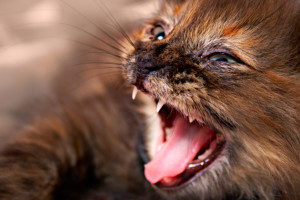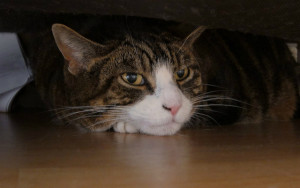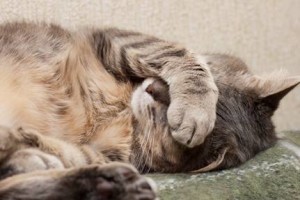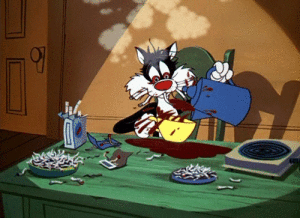
Call us Now ![]() +91-8744012053
+91-8744012053
Mon - Sat ~ 10:00 AM - 6:00 PM
Follow & Like
.png)


Call us Now ![]() +91-8744012053
+91-8744012053
Mon - Sat ~ 10:00 AM - 6:00 PM
Follow & Like
.png)


Stress in cats can be caused by an illness, fear or when your cat is anxious. However house cats are good at hiding their pain making it difficult for their human parents to timely detect disease or emotional trauma in the feline.
Signs of stress in a cat are very different from the ones displayed in humans. As a Cat parent if you understand these symptoms clearly, it will aid you in alleviating your pet’s pain whether emotional or physical.
You’ll need to see your vet ASAP if any of these signs surface in your kitty.
1. Aggressive Behavior in Cats: Aggression towards humans or other pets/animals in cat’s lingo means stress or pain.

Cats can’t express vocally so if suddenly your cat has turned aggressive take her to the vet’s clinic for a check up. Image – www.catster.com
2. Peeing inappropriately: When your housebroken cat pees outside its litter box, there’s something definitely bothering it. Instead of cringing at the sight of urine lying around the house try to analyse the underlying cause for a quick remedial action. Felines pee outside of their toilet for reasons such as health issue, a change in its litter box placement, when its toilet is not cleaned properly or there is too much noise & activity around the box.

Peeing inappropriately is the cat’s way of letting you know its uncomfortable or something isn’t the way it should be.
Image -www.canberracatvet.com.au
3. Excessive Grooming: If your kitty has started to over groom itself to a point that it has caused baldness and irritated skin in the mouser then you must immediately visit the vet. Normal grooming is acceptable cat behavior but when it turns into an obsession then definitely there’s something wrong with the pet. Licking and chewing on the coat also calms the cat so over-grooming directs at an anxious cat trying to soothe itself.
4. Appetite Loss: When your feline loses interest in food or stops eating completely it is a major sign depicting stress in the cat. Anxiety could be due to external/environmental factors or the pet could be suffering from an illness. Seek veterinary help for a quick recovery as fasting for any cat is a big NO.
5. Alienation: Isyour once social cat preferring Isolation over your company?

If your cat continues to hide and avoids greeting you when you return home from work, it is a clear sign that your kitty is upset due to pain or fear. Image – www.gentlejourneyaz.com/
6. Lethargy: Felines can sleep for 16 hours a day. Very young or old cats might end up sleeping even more. However if your playful pet cat has started sleeping way more than it usually does, this definitely needs to be addressed without delay.
If you notice any one of these signs seek professional advice. The veterinarian can examine the pet and ascertain if any medical condition is behind your cat’s stress. The doctor will also guide you towards steps that will lead to a stress-free living for the mouser.
2. Choose high quality cat food: A balanced diet that is in-sync with your feline’s age and lifestyle is a must.
3. Your cat must feel safe in your home: Cats love to nap in cozy spots so make sure you have many such intimate options for your kitty. When there is more than one cat in a home chances are that one of them might try to dominate the other/s. In such a scenario try to separate the pets with some kind of barrier in the room/s so that they aren’t visible to one another.
Article Resource : PetMD
Bonus GIF (giphy.com):
